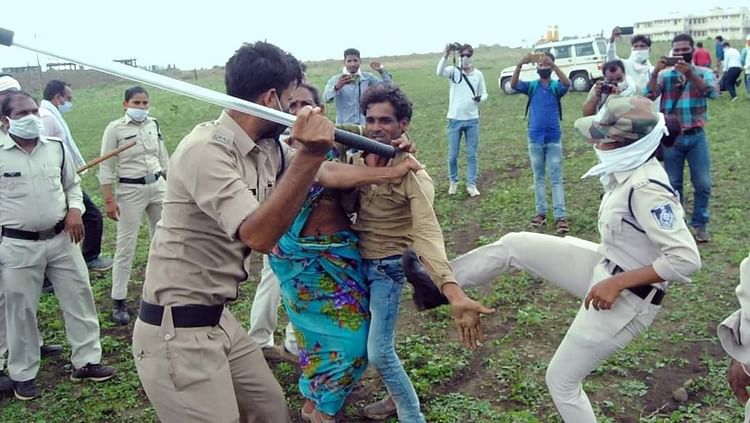–Ariba Neyaz
Conversations around police brutality sparked once again when a video showing the police beating up a man mercilessly went viral. The incident took place in Madhya Pradesh’s Guna district right after a team of local administration arrived to remove encroachment on a government land.
As per the information, about 20 bighas of land was allocated in Jaganpur Chak area for building up a college in Guna. Gappu Pardhi, who claims to own the land rented it out to Rajkumar Ahirwar, who started farming on it. When the Dalit man and his wife Savitri resisted their eviction, it led to a traumatic incident.
After an rage over the incident, six policemen, including a sub-inspector and two women constables were suspended. Taking note of the police brutality, the Guna District Collector S Vishwanathan and Superintendent of Police Tarun Nayak were also transferred.
The tragic episode throws light on the dearth of humanity leaving the family battered and bruised. Following the uproar, Chief Minister Shivraj Singh Chauhan said: “Any kind of vandalism will not be tolerated. A high-level inquiry has been ordered in Guna incident and action will be taken against whoever is guilty in this incident”. However, the crass assumption of justice should not be made.
It is not the first time when a macabre tale of police brutality has demonstrated the lack of accountability from India’s police. The recent case of Tamil Nadu where 59-year-old Jayarajand 31-year-old Bennicks were harshly beaten up and stripped naked leading to their custodial deaths. Beyond these recent cases, there are multiple instances where human dignity has been put in jeopardy by the Indian police.
Similar acts of brutality got highlighted when policemen exercised their unbridled power against the migrant labourers when they were returning to their hometowns following the nationwide lockdown.
Both the government at the centre and the governments in the states have abdicated to implement a clear system of accountability to punish those officers who stand guilty. The association of fear with police uniforms raises the question of trust in the system. The very idea of inheriting brutality with the nature of their roles to be performed is wrong.
There has been a sharp rise in cases showing excessive force by police leaving the common people floundering since the lockdown has been imposed. On the other hand, it is also important to know that long duty hours tend to exacerbate their difficulties. The pressure of working rigorously put them in very harsh conditions which sometime instigate them on little provocation. Yet, it could not be a justification of unleashing barbarity, especially on desperate people.
An overall social transformation with great mechanism of accountability can definitely help in improving the scenario we are prodded in. Above all, honest effort from within the police force is required to bring the much-needed change.
What is to be noticed here is the act of convenient activism by the power holders and celebrities that fails us as a society. The health crisis we are in today requires to bring out the best in all of us. As Anne Frank said: “How wonderful it is that nobody need wait a single moment before starting to improve the world.”
(Ariba Neyaz is a final-year undergraduate student of journalism in Delhi University and is also a budding filmmaker. the views expressed are personal)





